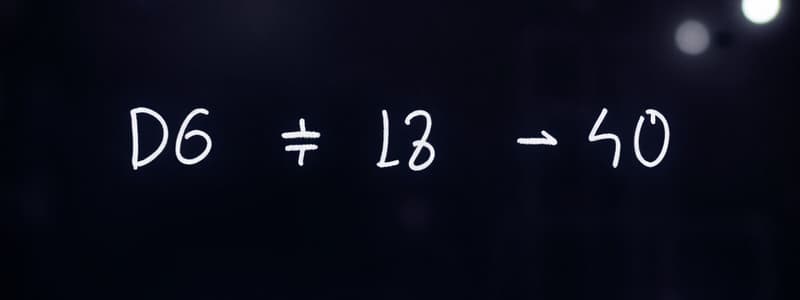Podcast
Questions and Answers
What is the equilibrium quantity based on the given demand and supply functions?
What is the equilibrium quantity based on the given demand and supply functions?
- 21.60 kilos (correct)
- 120 kilos
- 54 kilos
- 24.60 kilos
What is the equilibrium price when the demand and supply functions are set equal?
What is the equilibrium price when the demand and supply functions are set equal?
- 21.60 pesos
- 24.60 pesos (correct)
- 27.00 pesos
- 30.00 pesos
Which of the following represents the market equilibrium condition?
Which of the following represents the market equilibrium condition?
- Qd = Qs (correct)
- Qd < Qs
- Qd - Qs = 10
- Qd > Qs
How would you represent the demand function from the data provided?
How would you represent the demand function from the data provided?
What is the value of quantity supplied when the price is 25 pesos?
What is the value of quantity supplied when the price is 25 pesos?
What happens to the quantity supplied when the price of a good increases?
What happens to the quantity supplied when the price of a good increases?
Which factor does NOT contribute to shifts in the supply curve?
Which factor does NOT contribute to shifts in the supply curve?
What is the supply function equation provided for quantity supplied?
What is the supply function equation provided for quantity supplied?
What would be the quantity supplied (Qs) when the price (P) is set at 25?
What would be the quantity supplied (Qs) when the price (P) is set at 25?
Which situation would lead to a leftward shift in the supply curve?
Which situation would lead to a leftward shift in the supply curve?
What is meant by equilibrium in a market?
What is meant by equilibrium in a market?
If a calamity occurs, which effect would it most likely have on the supply curve?
If a calamity occurs, which effect would it most likely have on the supply curve?
How is the supply schedule best described?
How is the supply schedule best described?
What is a demand schedule?
What is a demand schedule?
Which of the following factors is NOT a non-price determinant of demand?
Which of the following factors is NOT a non-price determinant of demand?
What does the demand function Qd = 120 - 4P represent?
What does the demand function Qd = 120 - 4P represent?
In the given example, at a price of 29.00 Php, what is the quantity demanded of sweet potatoes?
In the given example, at a price of 29.00 Php, what is the quantity demanded of sweet potatoes?
What does a shift of the demand curve to the right indicate?
What does a shift of the demand curve to the right indicate?
What is illustrated by the demand curve?
What is illustrated by the demand curve?
What is indicated by a reduction in quantity demanded along the demand curve?
What is indicated by a reduction in quantity demanded along the demand curve?
How do changes in related goods' prices affect demand?
How do changes in related goods' prices affect demand?
What is the primary cause of the rising prices of real estate and construction materials?
What is the primary cause of the rising prices of real estate and construction materials?
Which market structure is characterized by many buyers and sellers with no significant impact on market price?
Which market structure is characterized by many buyers and sellers with no significant impact on market price?
What type of government intervention is a Rent Control Law?
What type of government intervention is a Rent Control Law?
Which of the following best describes a monopoly?
Which of the following best describes a monopoly?
What defines an oligopoly in a market structure?
What defines an oligopoly in a market structure?
In which market structure do firms sell differentiated products, making entry and exit relatively easy?
In which market structure do firms sell differentiated products, making entry and exit relatively easy?
What does labor supply refer to in economic terms?
What does labor supply refer to in economic terms?
Which of the following is NOT a characteristic of perfect competition?
Which of the following is NOT a characteristic of perfect competition?
What was the employment rate in June 2024?
What was the employment rate in June 2024?
What percentage of Overseas Filipino Workers (OFWs) worked overseas without a contract in 2019?
What percentage of Overseas Filipino Workers (OFWs) worked overseas without a contract in 2019?
Which age group comprised the largest proportion of Overseas Filipino Workers?
Which age group comprised the largest proportion of Overseas Filipino Workers?
What was the unemployment rate in 2023?
What was the unemployment rate in 2023?
What was the underemployment rate in June 2024?
What was the underemployment rate in June 2024?
As of September 2024, what is the estimated current population of the Philippines?
As of September 2024, what is the estimated current population of the Philippines?
What percentage of female OFWs were in the age group 25 to 34 years?
What percentage of female OFWs were in the age group 25 to 34 years?
What was the labor force participation rate in 2022?
What was the labor force participation rate in 2022?
Flashcards are hidden until you start studying
Study Notes
Non-Price Determinants of Demand
- Income, Taste, Expectations of future price and income, Prices of related goods, Population can cause an upward or downward change in the entire demand for a product.
- This change is referred to as a shift of the demand curve.
Demand Schedule
- A table that shows the inverse relationship between price (P) and quantity demanded (Q or Qd)
Demand Function
- A mathematical expression that expresses the relationship of quantity demanded (Qd) and price (P).
- Demand Function is Qd = 120 – 4P
- Qd is the quantity demanded
- UD (120) is unwanted demand
- 4P is the change in the demand
- P is the price
Demand Curve
- A graphical representation of the relationship between price (P) and quantity demanded (Q or Qd).
Change in Quantity Demanded
- Demand for a commodity changes due to changes in its price.
- This is a shift along the demand curve.
- If the price goes from $50 and a quantity of 100, to $20 and a quantity of 200, this demonstrates a change in quantity demanded.
Change in Demand
- When the demand for a commodity changes due to other factors, such as income, population, taste and preferences, and price of related goods.
- This causes the demand curve to shift to the left or to the right.
- If the price remains the same, say $50, but the quantity demanded changes from 100 to 200, this indicates a shift in demand.
Supply
- Refers to the quantity of goods that a seller is willing to offer for sale.
The Law of Supply
- As the price increases, the quantity supplied of that product also increases.
- This means as the price increases, the seller is willing to offer more of the good for sale as they see an opportunity to increase their income.
- The high price is a motivation for the seller to offer more.
Non-Price Determinants of Supply
- Cost of production, Technology, Availability of raw materials and resources can cause an upward or downward change in the entire supply of the product.
- This is referred to as a shift of the supply curve.
Supply Function
- A mathematical expression that expresses the relationship of quantity supplied (Qs) and price (P)
- This is represented by: Qs = -126+6P
- Qs is the quantity supplied
- US (-126) is unwanted supply
- 6P is the change in the supply
- P is the price
Supply Schedule
- A table showing the direct relationship between price and quantity supplied.
Supply Curve
- A graphical representation of the relationship between price (P) and quantity supplied (Qs).
Shifts in the Supply Curve
- Use of technology, Subsidy on the expenditures of producers, Increase in the number of sellers, and Increase in the price of related product can increase supply.
- Calamities, Decrease in the number of sellers, Lack of subsidy, Lack of technology, and Low prices of commodities can decrease supply.
Equilibrium
- A state of balance when demand is equal to supply.
- This means that the quantity that sellers are willing to sell is also the quantity that buyers are willing to buy for a price.
- It is an implicit agreement between how much buyers and sellers are willing to transact.
Equilibrium Price
- The price at which demand and supply are equal.
Equilibrium Quantity
- The quantity of products that both buyers and sellers agree to transact at a specified price.
Market Equilibrium
- Qd = Qs
Computation Practices
- Compute for the Demand and the Supply Schedule.
- Graph the demand and the supply curve.
- Compute for the equilibrium price and equilibrium quantity.
Market Structures
- Competition is rivalry among various sellers in the market.
Perfect Competition
- Implies an ideal situation for buyers and sellers.
- There are so many buyers and sellers that each has a negligible impact on market price.
- Homogeneous product is sold by sellers.
- Perfect mobility of resources.
- There is perfect knowledge of economic agents of market conditions.
- Market price and quantity of output are determined exclusively by forces of demand and supply.
Imperfect Competition
- Monopoly exists when a single firm that sells in that market has no close substitutes.
- Oligopoly is a market dominated by a small number of strategically interacting firms.
- Monopolistic Competition is where products are differentiated and entry and exit are easy.
- Government regulation is often necessary in imperfect markets to ensure fair competition.
Application of Demand and Supply to Philippine Economic Problems
- Labor supply (Labor force) refers to the portion of the population who are 15 years old and over, and who are willing and able to work.
- This includes those who are actively seeking work but have not found work, and those who are employed.
- It does not include housewives/househusbands, full time students, those who are physically or mentally disabled, or those who do not wish to work.
Overseas Filipino Workers (OFWs) & Statistics
- In 2019, the estimated number of OFWs was 2.2 million.
- Overseas Contract Workers (OCWs), or those with existing work contracts, made up 96.8% of the total OFWs during that period.
- The remaining 3.2% worked overseas without a contract.
- The proportion of female OFWs was higher than male OFWs, at 56% and 44% respectively.
- 22.6% of all OFWs were in the age group 30-34 years.
- 20.7% were in the age group 25-29 years.
- Female OFWs were younger than male OFWs.
- 7% of female OFWs were in the age group 15-24 years, and 46.9% were in the age group 25-34 years.
- In the same age groups, male OFWs were 5.4% and 38.6% respectively.
- There were more male OFWs (38.1%) than female OFWs (27%) in the age group 40 and over.
- Approximately 39.6% of OFWs worked in elementary occupations.
- Around 18% worked as service and sales workers.
Studying That Suits You
Use AI to generate personalized quizzes and flashcards to suit your learning preferences.




